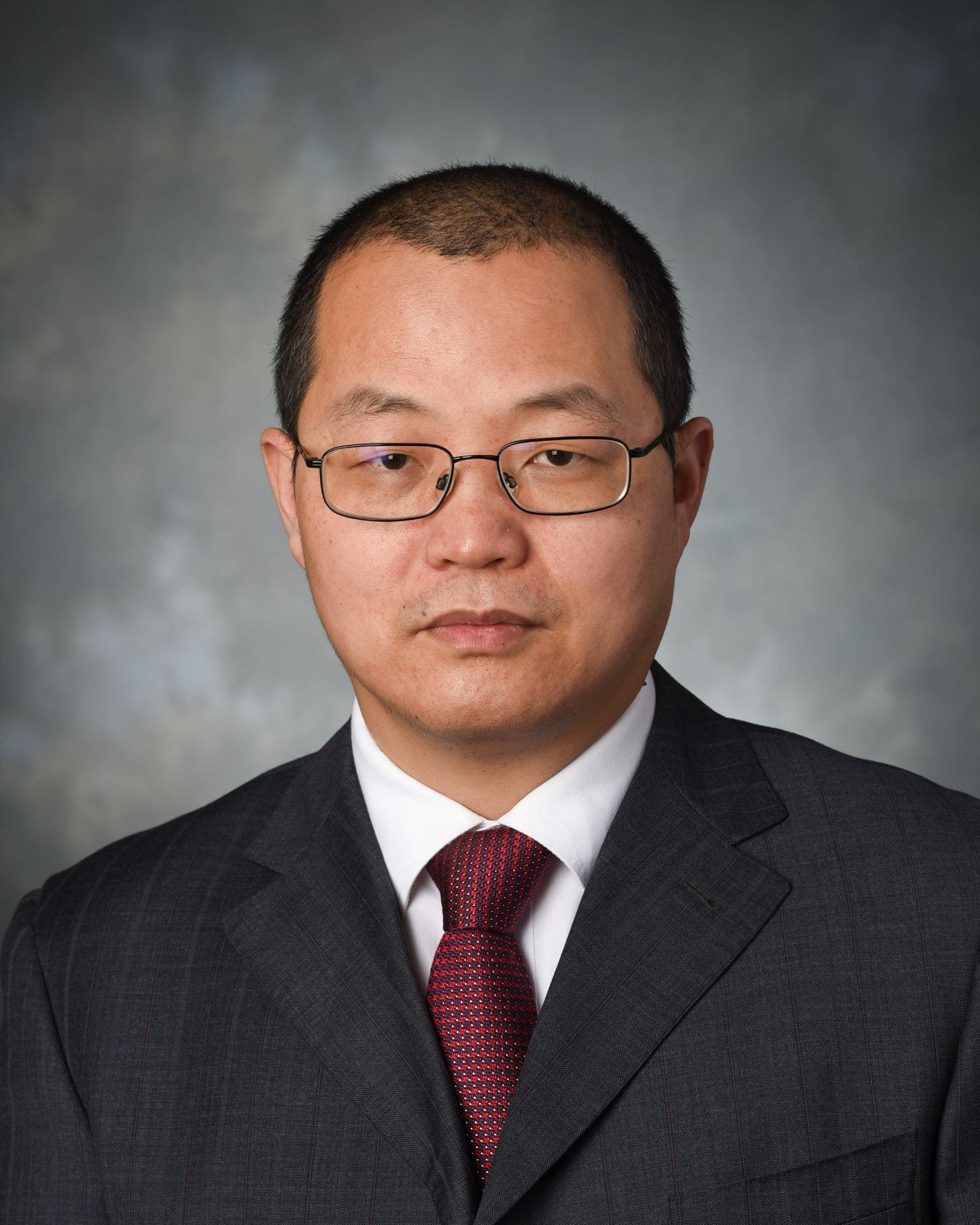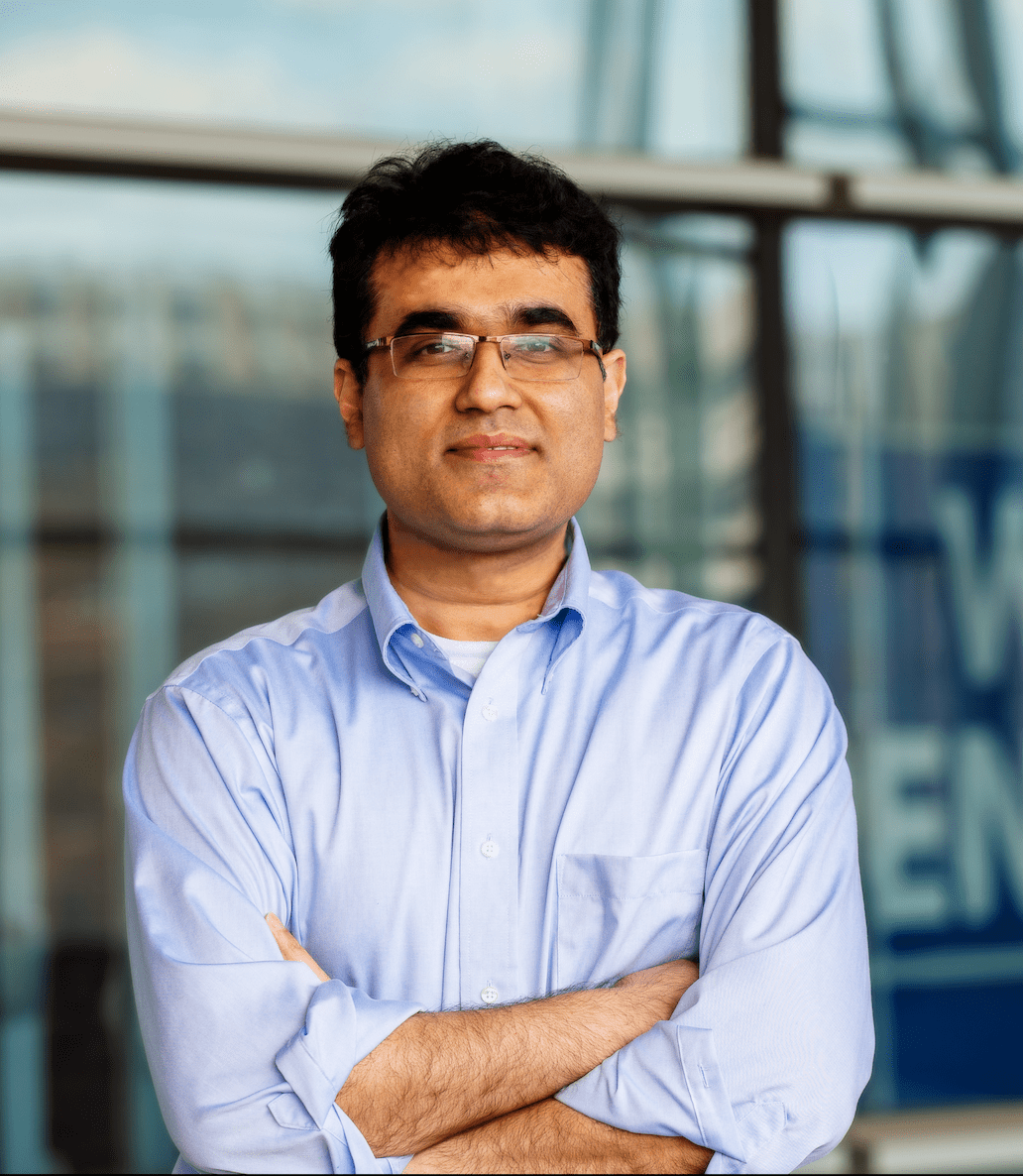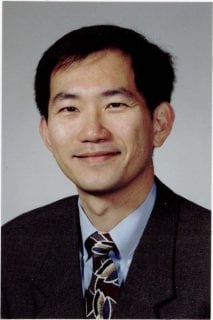
G. Gary Tan, Co-Director of INSR
Dr. Tan is a Professor in the Computer Science and Engineering Department and also a co-hire at the Institute for Computational and Data Sciences of the Pennsylvania State University. He obtained his B.E. in Computer Science from Tsinghua University, and his Ph.D. in Computer Science from Princeton University. His research interests are computer security, formal methods, and programming languages. He leads the Security of Software (SOS) Group, which is broadly interested in applying compiler, programming language, and formal method techniques to improving computer security. He currently serves on the DARPA ISAT study group. He has also received multiple awards, including a James F. Will Career Development Professorship, an NSF CAREER Award, two Google Research Awards, a Distinguished Reviewer Award at 2018 IEEE Symposium on Security and Privacy, a Ruth and Joel Spira Excellence in Teaching Award at Penn State, and some best paper awards at academic conferences.
Research Interests: Software security, programming languages, computer security, software engineering, formal methods, program verification.

Guohong Cao, Co-Director of INSR
Guohong Cao is a Distinguished Professor in the Department of Computer Science and Engineering at the Pennsylvania State University. He has published more than 200 papers in the areas of wireless networks, mobile computing, machine learning, wireless security and privacy, and Internet of Things, which have been cited over 20000 times. He has served on the editorial board of IEEE Transactions on Mobile Computing, IEEE Transactions on Wireless Communications, and IEEE Transactions on Vehicular Technology, and has served on the organizing and technical program committees of many conferences, including the TPC Chair/Co-Chair of IEEE SRDS, MASS, and INFOCOM. He has received several best paper awards, the IEEE INFOCOM Test of Time award, and the NSF CAREER award. He is a Fellow of the AAAS and a Fellow of the IEEE.
Research Interests: Wireless networks, mobile computing, machine learning, wireless security and privacy, and Internet of Things.

Thomas F. La Porta is the Director of the School of Electrical Engineering and Computer Science (EECS) and Penn State University. He is an Evan Pugh Professor and the William E. Leonhard Chair Professor in the Computer Science and Engineering Department. He was the founding Director of the Institute of Networking and Security Research at Penn State. Prior to joining Penn State, Dr. La Porta was with Bell Laboratories for 17 years. He was the Director of the Mobile Networking Research Department in Bell Laboratories, Lucent Technologies where he led various projects in wireless and mobile networking. He is an IEEE Fellow, Bell Labs Fellow, received the Bell Labs Distinguished Technical Staff Award, and an Eta Kappa Nu Outstanding Young Electrical Engineer Award. He also won two Thomas Alva Edison Patent Awards. His research interests include mobility management, signaling and control for wireless networks, security for wireless systems, mobile data systems, and protocol design. Dr. La Porta was the founding Editor-in-Chief of the IEEE Transactions on Mobile Computing. He served as Editor-in-Chief of IEEE Personal Communications Magazine. He was the Director of Magazines for the IEEE Communications Society and was on its Board of Governors for three years. He has published numerous papers and holds 39 patents. He was an adjunct member of faculty at Columbia University for 7 years where he taught courses on mobile networking and protocol design.
Research Interests: Mobility management, mobile data systems including networks, protocols, and applications, signaling and control for telecommunication networks, security for wireless networks.

Swraoop Ghosh was a Senior Research and Development Engineer in Advanced Design, Intel Corp from 2008 to 2012. At Intel, his research was focused on low power and robust embedded memory design in scaled technologies. He has four U.S. patents, published over 50 papers, and authored a book chapter. His research interests include low-power circuits, hardware security and digital testing for nanometer technologies. Dr. Ghosh is serving as Associate Editor of the IEEE TRANSACTIONS ON CIRCUITS AND SYSTEMS I and technical advisory board member of Hakham Inc. He is the lead guest editor of IEEE Journal of Emerging Topics on Circuits and Systems. He has also served in the technical program committees of ACM/IEEE conferences such as DAC, ICCAD, DATE, ISLPED, Nanoarch and ISQED. Dr. Ghosh is a recipient of DARPA Young Faculty Award (2015), ACM SIGDA Outstanding New Faculty Award (2016), USF Outstanding Research Achievement Award (2015) and College of Engineering Outstanding Research Achievement Award (2015).
Research Interests: Intersection of circuits, micro-architecture and hardware security using CMOS and post-CMOS Nano-technologies to meet the energy-efficiency and security/privacy of rapidly evolving mobile computing.

Mahanth Gowda is a Wormley Family Early Career Professor in Computer Science and Engineering at Penn State. He obtained his Ph.D. from University of Illinois at Urbana Champaign and Bachelors from Indian Institute of Technology, Varanasi. His research interests include wireless networking, mobile sensing, security, and wearable computing, with applications to IoT, cyber physical systems, and human gesture recognition. He is a recipient of an NSF CAREER Award in 2021 and multiple best paper awards under IEEE/ACM. He has published across diverse research forums including NSDI, MobiCom, WWW, Oakland, Hotnets, ASPLOS, etc.
Research Interests: Wireless networking, mobile sensing, security, and wearable computing, with applications to IoT, cyber physical systems, and human gesture recognition.

Ting He is an Associate Professor in the Computer Science and Engineering Department at the Pennsylvania State University, and is also affiliated with the Center for Artificial Intelligence Foundations and Engineered Systems (CAFE) and the Institute of Networking and Security Research (INSR). Before that, Dr. He was a Research Staff Member at the IBM T. J. Watson Research Center from 2007 to 2016. Dr. He is an IEEE Senior Member, and has served as Associate Editor for IEEE/ACM Transactions on Networking (2017-2023) and IEEE Transactions on Communications (2017-2020), General Co-Chair for IEEE RTCSA (2023), TPC Co-Chair for IEEE ICCCN (2022), TPC Area Chair for IEEE INFOCOM (2021), and TPC member for many top communication/networking conferences. Dr. He has published over 100 papers in refereed journals/conferences and 13 patents. Her work received the 2021 IEEE Communications Society Leonard G. Abraham Prize, the Kenneth C. Sevcik Outstanding Student Paper Award at SIGMETRICS’15, the Best Paper Award at ICDCS’13, the Best Student Paper Award at ICASSP’05, and Best Paper Finalist at SmartGridComm’20 and IMC’13. She also received the Awards for Military Impact and Commercial Prosperity of Coreset Research by the International Technology Alliance (ITA) in Distributed Analytics and Information Science (DAIS) in 2021, the Most Collaboratively Complete Publications Award by the ITA in Network and Information Sciences (NIS) in 2015, the IBM Research Division Award for Scientific Advances in Quality of Information in 2016, and multiple Outstanding Contributor Awards and Invention Achievement Awards from IBM in 2007-2016, as well as multiple Distinguished TPC Member Awards from INFOCOM in 2016-2020.
Research Interests: Network tomography, network security, mobile edge computing, distributed/federated machine learning, statistical inference, and resource allocation.

Bin Li is an associate professor in the Department of Electrical Engineering at the Pennsylvania State University. He received his B.S. degree in Electronic and Information Engineering, M.S. degree in Communication and Information Engineering, both from Xiamen University, and Ph.D. degree in Electrical and Computer Engineering from The Ohio State University (OSU). He was a Postdoctoral Researcher in the Coordinated Science Lab at the University of Illinois at Urbana-Champaign (UIUC). His research focuses on the intersection of networking, machine learning, and system development, and their applications in networking for virtual/augmented reality, mobile edge computing, mobile crowd-learning, and Internet-of-Things (IoT). He has served on the technical committees of several major conferences in networking, such as ACM MobiHoc, IEEE INFOCOM, and WiOpt. He is a senior member of the IEEE and a member of the ACM. He received both the National Science Foundation (NSF) CAREER Award and Google Faculty Research Award in 2020, IEEE INFOCOM 2023 Best Demo Award, and ACM MobiHoc 2018 Best Poster Award.
Research Interests: Intersection of networking, machine learning, and system development, and their applications in networking for virtual/augmented reality, mobile edge computing, mobile crowd-learning, and Internet-of-Things (IoT).

Rômulo Meira-Góes is an Assistant Professor in the Department of Electrical Engineering at Penn State. Previously, he was a postdoctoral researcher working with Eunsuk Kang, Stavros Tripakis, and Stéphane Lafortune at Carnegie Mellon University and the University of Michigan. In 2022, he received the CPS rising stars award from the University of Virginia. He received his Ph.D. in Electrical and Computer Engineering from the University of Michigan in 2020, working with Stéphane Lafortune. Prior to the University of Michigan, he earned his B.S. degree in Electrical Engineering from the Universidade Tecnológica Federal do Paraná – Curitiba in 2015.
Webpage: https://romulo-goes.github.io/
Research Interests: Systems and Controls; Formal Methods; Robotics.

Sencun Zhu received the B.S. degree in Precision Instruments from Tsinghua University, Beijing, China, in 1996 and the M.S. degree in Signal Processing from University of Science and Technology of China, Graduate School at Beijing, in 1999. He received the PhD degree in Information Technology from George Mason University in 2004. His current research interests include wireless and mobile security, privacy, ML/DL applications and AI security, federated learning security. His research has been funded by NSF, NIST, ARO/ARL. He was a recipient of NSF Career Award and Google Faculty Research Award. He has served on the editorial board of multiple journals such as IEEE Transactions on Mobile Computing, and has served as the TPC Co-chair or General Co-chair of multiple conferences (e.g., IEEE CNS, EAI SecureComm, IFIP DBSec). He is a member of the Networking and Security Research Center and is also affiliated with the Cyber Security Lab.
Research Interests: wireless and mobile security, privacy, IoT security, ML/DL applications and AI security, federated learning security.

I am an Associate Professor in the Department of Electrical Engineering at the Pennsylvania State University. I received my B.S. from the University of Science and Technology of China (USTC), and M.S. and PhD degrees from the University of Maryland, College Park, all in Electrical Engineering. I received an NSF CAREER award in 2015 and the WICE Early Achievement Award in 2020, and was selected as one of the 2020 N2Women: Stars in Computer Networking and Communications.
Research Interests: machine learning, wireless communications and networking, and information theory.

Shagufta Mehnaz obtained her Ph.D. degree in Computer Science from Purdue University in August 2020, held a full-time tenure-track Assistant Professor position at Dartmouth College from 2020-2022, and her full-time tenure-track appointment in the Department of Computer Science and Engineering in the School of Electrical Engineering and Computer Science (EECS) at Penn State began in Fall 2022. Her research interests are at the intersection of information privacy, security, and machine learning (ML), with an emphasis on privacy and security of machine learning, privacy-preserving analytics, and machine learning for security. More details about her research are available at https://smehnaz.github.io/.
Research Interests: Information privacy, security, and machine learning (ML), emphasis on privacy and security of machine learning, privacy-preserving analytics, and machine learning for security.

Syed Rafiul Hussain is an Assistant Professor in the Department of Computer Science and Engineering at Pennsylvania State University. Before joining Penn State, he worked as a postdoctoral researcher at Purdue University from where he also received his Ph.D. in December 2018. His research interests broadly lie in network and systems security. He received the NSF CAREER award and the DARPA Young Faculty Award in 2022 for. He has been inducted into the Hall of Fame Mobile Security Research by the GSMA for his contribution to uncovering new protocol flaws in 4G and 5G cellular networks that led to several changes in the standards. More details about him and his research are available at https://syed-rafiul-hussain.github.io/ and https://synsec-den.github.io/.
Research Interests: Network and systems security.

Dr. Lee performs cross-area research in database systems, pervasive/mobile computing, and networking. He is particularly interested in developing data management techniques (including accessing, indexing, caching, aggregation, dissemination, and query processing) for supporting complex queries in a wide spectrum of networking and mobile environments such as peer-to-peer networks, mobile ad-hoc networks, wireless sensor networks, and wireless broadcast systems. Meanwhile, he works on object-oriented databases, XML, security, and information integration and retrieval.
Research Interests: Mobile and Pervasive Data Access, Location-based services, Peer-2-Peer Computing, Wireless Sensor Networks, Time Critical and Secure Wireless Data Broadcast, Information Retrieval Visualization and Analysis, Mobile Ad Hoc Networks, XML and Access Control, and Object-Oriented Databases.

He received my Ph.D from the University of California, Irvine in 2011. Between 2011 and 2014, he was a postdoctoral researcher, jointly with the Electrical and Computer Engineering department at Boston University, and the Research Laboratory of Electronics (RLE) at the Massachusetts Institute of Technology (MIT). He received the 2009 IEEE Information Theory Society Best Paper Award, the 2014 IEEE International Symposium on Network Computing and Applications (NCA) Best Paper Award, an NSF Career Award in 2016 and was a finalist for the Bell Labs Prize in 2016. His research involves understanding of distributed data processing, storage and communication systems using the tools of information and coding theory, and distributed systems theory.
Research Interests: Distributed Data Processing, Storage and Communication Systems using the Tools of Information and Coding Theory, and Distributed Systems Theory.

Allan Sonsteby has served as the deputy executive director of the Applied Research Laboratory at Penn State since 2014. He previously served as ARL’s associate director from 2002 to 2014. His areas of expertise include cyber defense and offense, electronic warfare, and signal and data processing.
Research Interests: Cyber Defense and Offense, Electronic Warfare, and Signal and Data Processing.
